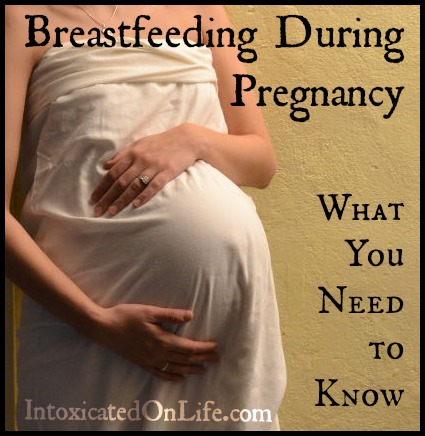
Through La Leche League and online parenting forums, I found that it was safe to nurse through pregnancy, but there was much I didn’t know before I experienced it. I didn’t know what physical and emotional changes my body would undergo. I also wasn’t aware of how the relationship with my toddler would change.
Benefits of Breastfeeding During Pregnancy
Fatigue is a very common symptom of pregnancy. Having a toddler running around made my fatigue all the more difficult to deal with. Many moms find continuing to breastfeeding allows them to have down time they wouldn’t get otherwise.
Having my firstborn snuggle my belly and feel her baby sister kick opened up a lot of opportunity for discussion about the new baby that would be joining our family.
I also feel that it created a strong bond between the girls before our second was even born. Many studies say that talking to your unborn child is a great way for mothers and fathers alike to bond. Newborns recognize the voices of those who talk to them in utero. I found this true with my older nursling and her newborn sister as well.
Tandem nursing was a great benefit and a big reason we stuck out all the hiccups along the way.
Are there Safety Concerns?
Some people are concerned that breastfeeding while pregnant will cause miscarriage or preterm delivery. This is an unfounded concern in most cases.
Nursing does cause contractions of the uterus, however these contractions are comparable to the contractions caused by sexual arousal, orgasm, or any nipple stimulation. Mothers who have been placed on pelvic rest are typically advised to stop nursing because these could be cause for alarm in their specific cases. The same holds true for mothers who are experiencing preterm labor.
Some mothers and their caregivers choose the wait-and-see approach in these instances, but it is important to be honest and forthcoming with your caregivers about nursing should you have any complications during your pregnancy. While breastfeeding during pregnancy will not cause complications, in the face of some already existing complications it can be necessary to wean for the duration of pregnancy.
Physical Changes
Pregnancy brings on many physical changes by itself. Hormonal shifts that cause these changes can bring changes to your nursing relationship as well.
One of the first issues many mothers face is nipple soreness, a very common early-pregnancy symptom that is made all the worse for some mothers by breastfeeding. Some mothers find relief after a few weeks. When relief is found varies mother to mother as does the extent of sore nipples. Some mothers try cold compresses to ease the soreness.
Nursing boundaries that many moms find effective for helping soreness are limiting nursing sessions to certain times of day or limiting the length of nursing sessions to cut down the amount of stimulation. Many moms also choose to stop a breastfeeding session when their nursling gets too wiggly. It is important to find your own personal limitations and do what is best for you and your nursling.
Most likely, during pregnancy, your milk will change. The changes vary from mother to mother. Some mothers dry up almost immediately. Others seem to have enough milk for their nursling throughout pregnancy. Some have their milk supply decrease and/or change to colostrum. This can happen from the very first weeks to the very end of pregnancy.
Drinking plenty of water, eating well, and nursing will help keep your supply up as best as it is able to stay. Nothing can really prevent the pregnancy hormones from overriding the milk producing hormone, prolactin, and changing your milk if it is going to change. Fenugreek, an herb commonly used to increase supply, should never be used during pregnancy as it can cause miscarriage.
Many nurslings will self-wean when the milk changes or dries up because they become frustrated or dislike the taste. Some nurslings don’t mind continuing to “dry nurse” in the absence of milk. As long as you are comfortable with it, it is beneficial for your continued bond and easing the transition of a new sibling.
Emotional Changes
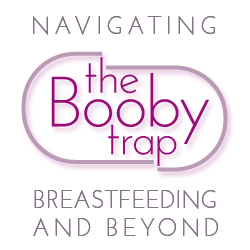
Thankfully, I went on to enjoy nursing both of my little ones after birth. Most mothers who experience pregnancy-related nursing aversion do find that they begin to enjoy nursing again after birth, if they enjoyed it prior to getting pregnant. Some moms find that nursing their toddler continues to be an uncomfortable experience and choose to either enforce more boundaries or wean at this time. Those who continue to have nursing aversions with their infant well after birth may have D-MER (Dysphoric Milk Ejaculation Reflex) and should seek help if they wish to continue breastfeeding.
Breastfeeding Nutrition During Pregnancy
A mother nursing through pregnancy will need more calories than mothers who are not. Water intake is extremely important as well as having a healthy, balanced diet.
A general rule of thumb for water intake is half your weight in ounces of water. So a 160 pound person would need to take in 80 ounces of water per day. This should increase as weight is gained through pregnancy. For mothers with nurslings under a year, formula supplementation often becomes necessary to make up for loss of supply. Watching for hydration and weight changes in the nursling is helpful in assessing the need for supplementation. For toddlers who are eating a wide variety of solid food, just continue offering a healthy variety of foods.


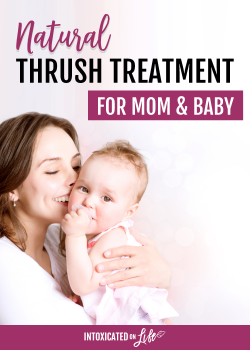
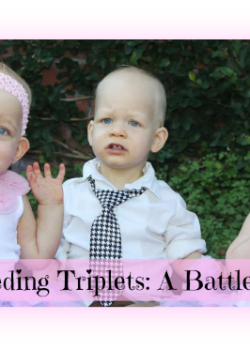
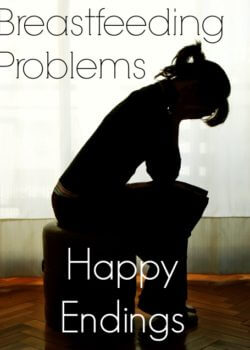


Retired LLL leader and mother of 12 here..:) Have been nursing for 17 1/2 yrs now without stopping also…Great info! When pg you will eventually lose your milk as your body prepares for your new baby and your breasts begin to produce colostrum for the first few days after birth. Which means your toddler will again get colostrum and all the benefits this brings!! 🙂
Um…..that. is. INCREDIBLE!! You’re a superhero!! I’ve always wondered about the toddler eating up all the colostrum that the baby will need, could that happen?
The amazing thing about your body is that, in most cases, it makes what you tell it to! There will be enough colostrum for both the nurslings until mature milk comes in.
So so so impressive. Way to go! I have been nursing non-stop for almost four years. And with a 9 month old and hopes of at least one more, I expect to be nursing for many more years – but 17 1/2 – I would be nursing at age 50! he he he You rock, mama!
I’m currently nursing through the last stretch of pregnancy (My nursling is 2.5 years) and it is probably the hardest thing I have ever done. It’s a constant cycle of dread, aversion, and then guilt. It is comforting to know that most moms are OK with nursing again once the baby is born. My biggest fear is that I won’t want to nurse EITHER child after delivery. I started off with such dreams of tandem nursing but at the moment I’d happily give my breasts up altogether if it meant never nursing again!
I had those same fears. The biggest benefit of nursing through pregnancy for me was the tandem nursing at the end. It was such a big goal and I was afraid my aversions were going to make that dream impossible. I was thankfully able to tandem nurse for 2 full years. Hang in there, you’re almost through it!
That is so good to hear, and very reassuring at this point. Because I take it back — My biggest fear would actually be having to wean my toddler once his baby brother is born. Hopefully the aversions do disappear and my big one can “teach” the little one to nurse the way I daydreamed when I first got pregnant. Thank you!
Very good article. I nursed both of my youngest 2 children at the same time. The older was was very considerate of the younger one. It was like he knew she needed it more. And they were best of friends as they were growing up.
I nursed through my pregnancy, too – and I’ve been tandem nursing ever since. I so relate to much of this. I will also add, that when my water broke, my contractions were only puttering along. Well, nursing my daughter to sleep (for about an hour) kicked things into high gear. My son was born (via natural VBAC) just a few hours later. Thanks for sharing with the Tuesday Baby Link Up Community. I’d love to feature this post this week, would you be willing to provide a link back at the end to one of the hosts? Thanks!
I had extremely sore nipples when I was preggers with #2 and my milk changed really fast. My son called it “yucky milk” but it wasn’t yucky enough for him to stop drinking it. I did have to institute a 3 second rule to handle the aversion and the pain. I was very happy to have a nursing 2 year old once baby was born and my milk came in.
I was still nursing my 24 month old when I found out that I was pregnant with twins.
The doctor wanted me to stop nursing but with the encouragement from my La Leche League group leaders I continued nursing through the entire pregnancy . . .
My twins were born at 40 weeks on their due date (7 lbs 1 oz & 6 lbs 5 oz) — & I was never on bed rest!
Anyway, after the twins were born I continued to nurse all 3 for about 3 months until my oldest turned 3.
I would let her nurse first to relieve engorgement & then I would let the twins nurse.
(Later on, I had to have her eat her solid food first then nurse after the twins bc she was just happy to fill up on all the good baby milk too — she was so chubby & her cheeks were so rosy during that time — so cute!)
I continued to nurse the twins until they were 3 as well.
God is good, All the time!
This is so encouraging, i cant thank you enough for sharing. God bless.
Such great information. I so badly wanted to be able breastfeed both my boys when I had my second.
My first boy was 15mth old when I had my second. But sadly my 2nd lil fella came 5w early like my first. But he also tried to come at 8w early and two days before I started having those early scare contractions my toddler got frustrated and didn’t want a part of nursing cause my milk had turned to colostrum/close to dried up.
He was quite fine to stop he wasn’t bothered and it didn’t upset him to see his little brother drinking what he used to totally be very protective of his ‘drinks’.
I was a little disheartened though.
I love breastfeeding. It’s amazing how our bodies were created. My youngest is 14m now and I’m wanting to nurse him as long as he wants. He still wakes to nurse at night at least twice up to five times a night. And as tired as it makes me I’m glad he still wants his mummy.
I love your blog. It’s great. Thank you.
Keep it up. Xx
It sounds like you’ve done an amazing job with your boys. Don’t be discouraged. You were able to breastfeed your first little one for a good period of time. What a wonderful gift to give your sons. Good job mama. Enjoy this time with your youngest! It is such a precious time and I know I miss it 🙂